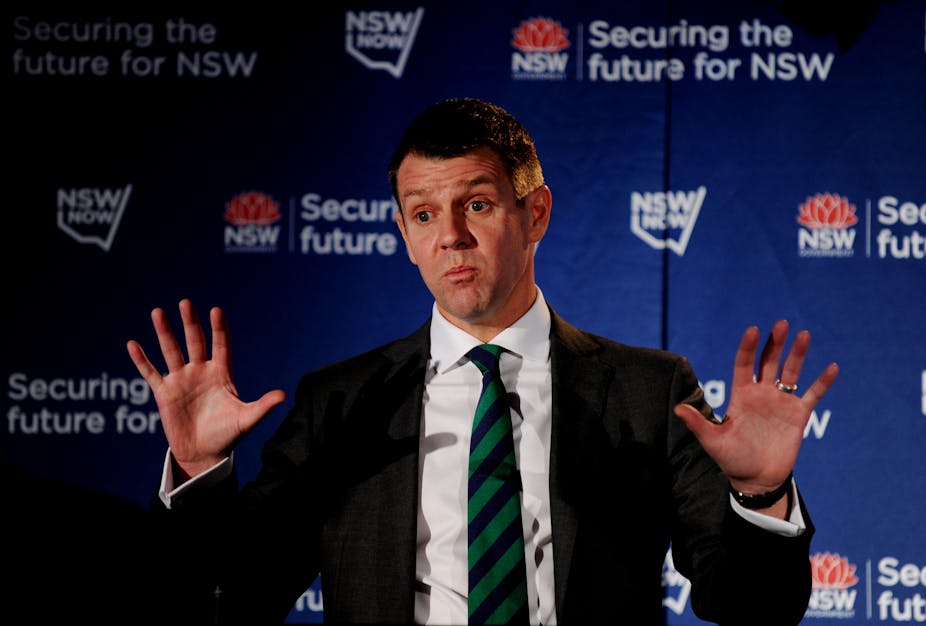Mike Baird has been elected unopposed as the new NSW Liberal Party leader, and will soon become the state’s 44th premier after the shock resignation of Barry O'Farrell yesterday. But what are the prospects of continuing reform to a state so long afflicted by the taint of corruption?
O’Farrell’s downfall, or rather the Independent Commission Against Corruption’s (ICAC) role in it, has assured that the issues of electoral funding, the cross-over between party officials and lobbyists and the lack of transparency in government relationships with business will be elevated onto the urgent agenda for all political parties over the next 11 months before the next state election.
Politically, Baird will not be a great change from O’Farrell. His reputation is that of a cautious man with an engaging personality, wary of ideological passion, not committed to any faction while clearly on the moderate wing of the party.
Baird is a religious and social conservative – much like prime minister Tony Abbott – and although he is not likely to be a God botherer in public office, he will bring a strong personal sense of ethical standards to his job. This should make it easy for Baird to address the urgent issues driving unethical conduct in NSW politics.
However, addressing those issues is fraught with peril for the Liberal Party. ICAC continues its scrutiny of politicians, and a number of Liberal MPs are in the firing line. One can also be sure that every member of the NSW parliament – no matter what party they belong to – will have spent some time yesterday reviewing which persons and organisations gave money or gifts to help in the last election.
In the three years since its crushing defeat at the polls, the Labor Party has accomplished very little in cleaning up its scandal-ridden behaviour, and it has not even had the complication of office to impede reform. Yet one does not have to be an admirer of opposition leader John Robertson to appreciate that his call for dialogue between the major parties in seeking a way forward to rid the state of corruption is a positive one.
Already old divisions in the NSW Liberal Party are re-asserting themselves. O’Farrell had not even had time to call the governor to advise of his resignation before elements on the right of the party have expressed their disappointment with O’Farrell’s three year reign.
Too timid? Afraid to take on the tough issues? Or not prepared to pursue an agenda of economic and social reform demanded by the radical right?
The party’s right faction also reportedly expressed opposition to a deal struck between Baird and new deputy Gladys Berejiklian – both of the party’s left – not to run against each other in the leadership ballot.
These critics have been relatively quiet for three years because O’Farrell’s mandate was so strong. But now? What mandate does Baird have that will put them back in their cages?
What about the Labor Party? There are some signs of new thinking – preselection of some candidates by a popular vote of local residents, the expulsion of former ministers caught up in ICAC’s web – but there has been no attempt to weaken the stranglehold on policy and management in the party by major trade unions and the Administrative Committee.
Robertson is not only overcautious and lacking in any charisma, but his path to parliamentary leadership began from his position at the head of Unions NSW.

It is customary for commentators to suggest that the Labor defeat in 2011 was so devastating that it could not possibly win an election in 2015. But there have been enough examples of wild swings of support in Australian politics over the last few years – including the Miranda byelection swing to the ALP in 2013 – to suggest that a savage defeat is not by itself a disqualification from electoral revival.
Given the problems in the Coalition, Labor could win next year if it completely reformed itself and renewed its leadership with good policy and personnel. But that is extremely unlikely in the time span available.
What is likely in the next 11 months is that both the Liberals and Labor will struggle to win back the support of a disillusioned electorate. The focus of the media will be on the government, as it should be, so that Baird’s positive contributions will be undercut by constant reminders of ethical frailty in all sections of his party.
What choice is there for the electorate? The Greens in NSW are not in a strong position to challenge for a much greater share of the vote. Perhaps there will be a revival for independent candidates who have made life very difficult for the National Party in the past and who might well annoy the other two major parties.
A firm – if much reduced – victory for the Coalition is the most likely outcome next year. That prediction, in itself, is likely to affect how seriously Baird tackles the underlying issues from O'Farrell’s departure. If he is likely to win anyway, why should he try too hard for reforms that will be difficult for business, lobbyists and the ideological right of his party to accept?

